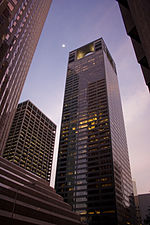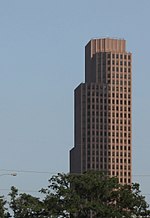Humble Oil Building

The Humble Oil Building, is a historic office building, designed in the Italian Renaissance architecture style, located at 1212 Main Street in Houston, Texas and listed on the National Register of Historic Places. It was constructed by Humble Oil and Refining Company in 1921. The tower section was added on to the building in 1936. The building complex served as the company headquarters for Humble Oil and Refining Company from 1921 until 1963, when the company moved into what is now the ExxonMobil Building at 800 Bell Street. In 2003, the building complex was renovated for use as a combination hotel and apartments, the apartment section was converted to additional hotel rooms in 2015.
Excerpt from the Wikipedia article Humble Oil Building (License: CC BY-SA 3.0, Authors, Images).Humble Oil Building
Travis Street, Houston
Geographical coordinates (GPS) Address Nearby Places Show on map
Geographical coordinates (GPS)
| Latitude | Longitude |
|---|---|
| N 29.755277777778 ° | E -95.366944444444 ° |
Address
Courtyard Houston Downtown/Convention Center
Travis Street
77006 Houston
United States
Open on Google Maps








